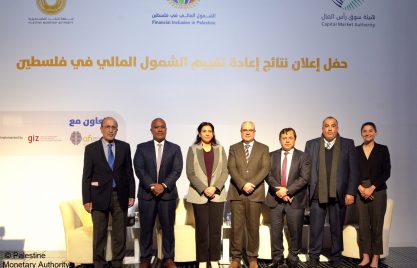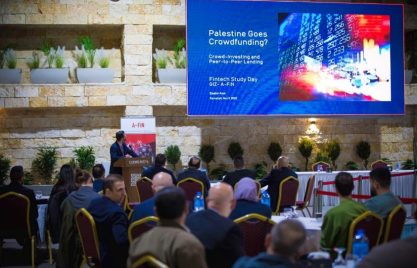Without understanding the risk and opportunities of new Fintech approaches for a specific market policymakers will not be able to provide an enabling regulatory environment, nor will private stakeholders and local entrepreneurs think to engage in new business models and provide new solutions. This is why the GIZ Alternative Approaches to Financial Inclusion of SME project (A-FIN) organized a Fintech Study Day to showcase in-depth research commissioned in the past two years.
The Fintech Study Day provided the opportunity for researchers, financial regulators, diaspora experts, academics and the private sector of the Palestinian fintech ecosystem to discuss and provide feedback about the knowledge gathered through A-FIN’s research on peer-to-peer lending, equity crowdfunding, eKYC, diaspora engagement, academia and Islamic fintech topics.

Fintech remains driving force of Financial Inclusion
Acknowledging the enormous potential that Fintech offers for improving the financial inclusion of broad sections of the Palestinian population, regulators and private stakeholders agreed upon a national strategy for financial inclusion in 2018: the emphasis of this strategy is on using technology and on educating and protecting the population. In addition, as a result of the 2020 corona virus pandemic, the need for innovative technological business models that replace cash and mobility has become particularly evident.
Subsequently the number of Fintech companies operating in and interested in the Palestinian market has increased remarkably in the last 2 years. With the licensing of 6 payment service providers since 2020 especially the payment and money transfer field has seen a steady increase recently. Moreover, regulators have opened their doors and launched the Innovation Office and the Regulatory Sandbox, more applications and market entries are expected and that is why knowledge on these potential new approaches is crucial.

Palestine goes crowdfunding?
One of the discussed Fintech solution which could enter the Palestinian market is crowdfunding. Crowdfunding has four types: donation-based, rewards based, lending based (crowdlending) and equity-based (crowdinvesting). The presented research included the findings of an assessment of the potential of crowdfunding as an alternative financing option for Palestinian SMEs, especially crowdlending and crowdinvesting, as well as a legal analysis on crowdinvesting & peer-to-peer (P2P) lending for the Palestinian context.
The assessment showed that crowdlending and crowdinvesting can have various socio-economic benefits. On a macroeconomic level, crowdinvesting and crowdlending facilitate increased investment in SMEs and boost economic activity in the SMEs sector. These platforms can play a substantial part in job creation if they are successfully able to mediate investments and lending to MSMEs. Moreover, these alternative financing tools are viable for further consideration due to the large Palestinian diaspora, an existing appetite for small ticket impact investment by the younger generation and the presence of essential ecosystem players willing to lead the initial investments in the crowdfunding ecosystem.
However, crowdlending and crowdinvesting are currently unavailable and legally not regulated in the Palestinian Territories. Regulators have signalized openness to build incentivizing frameworks. Therefore, a legal analysis has examined international best practices, comparative analysis, case studies of specific platforms and the local Palestinian legal framework. The analysis highlighted the need for a regulatory and supervisory framework that balances between the need to foster an enabling environment and mitigates potential risks stemming from the operation of crowdinvesting and P2P lending platforms. All these efforts must be led while keeping in mind the main objective of providing much-needed alternative financing sources for Palestinian SMEs.

Islamic Fintech Use Cases
A session on opportunities of Islamic Fintech in the Palestinian Territories provided insights in social finance, takaful and micro takaful shariah-compliant use cases for wealth management, deposits and lending, raising funds, payments as well as factoring for SMEs. The discussion was based on a report on Islamic Fintech commissioned by A-FIN which evaluates critical points in Islamic Fintech and its impact on financial inclusion in the Palestinian context to draw a roadmap for Fintech ecosystem stakeholders.
A main takeaway examining the Palestinian Islamic Fintech ecosystem is the need to develop a road map for this new vital sector. A governmental vision is crucial to make the Palestinian Territories an attractive market for Islamic Fintech service providers. The demand for Islamic Fintech (Government, Consumers, Corporates, and Financial Institutions) is high, but the supply side has not caught up yet. Policymakers must find the right balance between regulation required for consumer protection and preserving the growth and innovation of Islamic Fintech. Moreover, they have the opportunity to engage in regional agreements in Fintech and Islamic Fintech. As for the general investment landscape, the Palestinian political and economic instability is a stumbling block for investors, which requires clarifying the investment prospects and opportunities at the micro level.
More topics were covered such as insights on Regional Fintechs’ potential entry road to the Palestinian market. A separate blog post on the topic can be found here.
The Fintech Study Day resulted in various needed conversations and prolonged finance related arguments on the potential and roadblocks of Fintech use cases in the Palestinian Territories. We at A-FIN are eager to see Fintech pilots and use cases materialize as fruits of these enabled connections.
By Shurouq Qawariq and Robert Fischle
Shurouq.qawariq@giz.de and Robert.fischle@giz.de
Sources:
https://fsd-mena.org/news/regional-fintechs-path-to-palestine-a-future-waiting-to-happen/
https://www.wamda.com/en/2021/12/fintech-force-financial-inclusion-palestine



